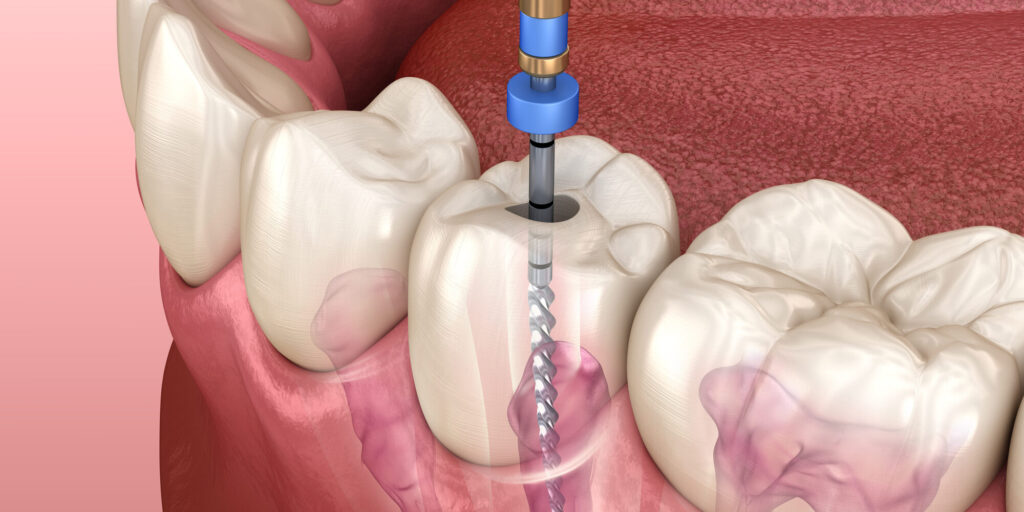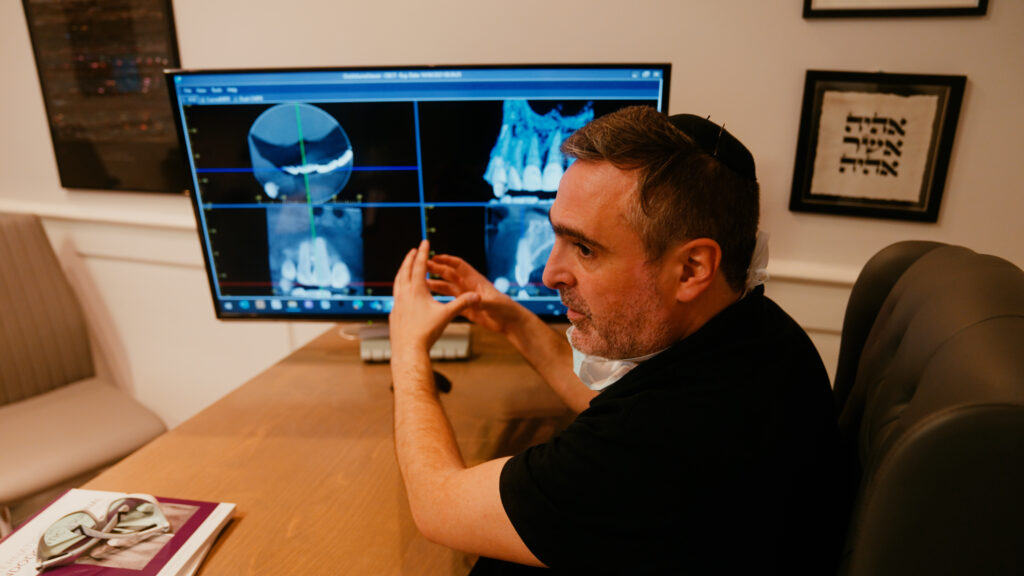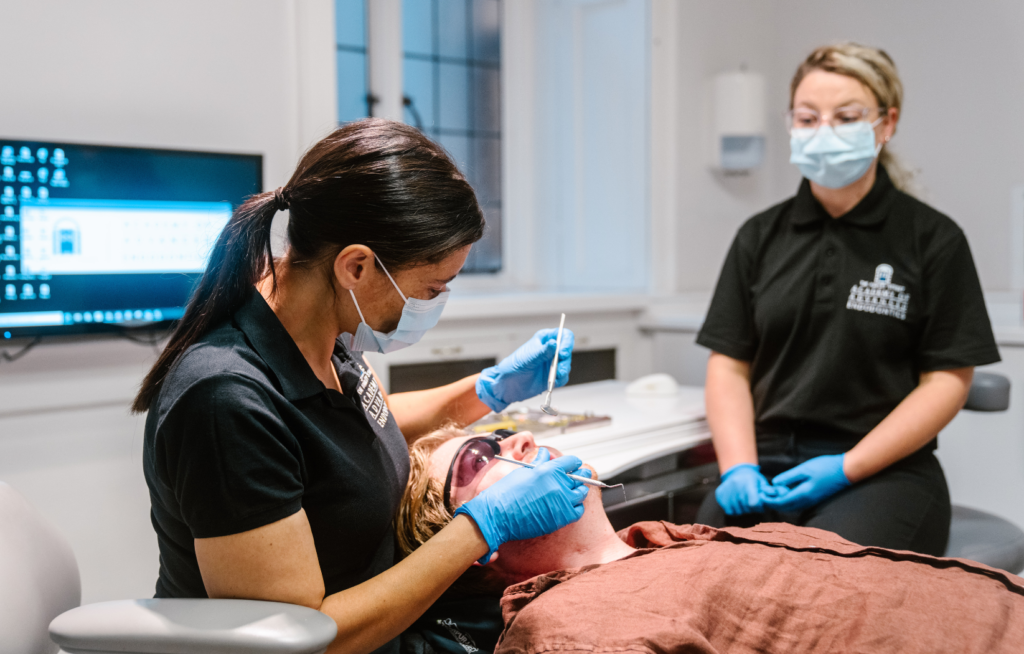
Introduction
As leading specialists in endodontic care, our mission is to provide expert treatments that not only alleviate pain but also preserve your natural teeth for as long as possible.
But ultimately, we’d prefer it if you didn’t require root canal treatment at all!
In this blog, we’ll explore root canals, their common causes, and, crucially, how to prevent the need for such treatment.
With our guidance, you’ll learn effective strategies to maintain your oral health.
Join us as we delve into the world of endodontics and empower you with the knowledge to avoid a root canal treatment.
What is a root canal?
A root canal is a common dental procedure aimed at saving a tooth that is severely decayed, broken or infected.
At the core of each tooth is soft tissue known as the pulp, which contains nerves, blood vessels and connective tissue.
When the pulp becomes inflamed, it can cause significant pain and, if left untreated, may lead to further complications such as infection, abscess or tooth loss.
The root canal procedure involves removing the damaged or infected pulp, cleaning and disinfecting the root canal spaces that contained the pulp tissue, then filling and sealing them to prevent infection or reinfection.
If you’re curious about the stages of root canal treatment, you can read our latest blog here.

What causes a root canal?
Root canal treatments are often necessary when the pulp inside your tooth becomes inflamed or infected.
This can occur for various reasons, each posing a risk to oral health.
- Deep Decay: The most common cause of pulp infection is deep tooth decay that reaches the inner layers of the tooth. Bacteria from the decay can invade the pulp, leading to infection and the need for a root canal.
- Dental Trauma: A blow to the mouth or a severe injury can damage the tooth’s structure, leading to cracks or chips that expose the pulp to bacteria.
- Repeated Dental Procedures: Frequent drilling or repeated dental treatments on the same tooth can stress the pulp, making it more susceptible to inflammation and infection.
- Cracks and Chips: Even small cracks or chips in a tooth can create a pathway for bacteria to enter and infect the pulp.
- Gum Disease: Advanced stages of gum disease can cause the gums to recede, exposing the tooth roots to bacteria and leading to infections that can extend into the pulp.
Regular dental check-ups and maintaining good oral hygiene will help prevent these issues. By catching problems early and addressing them promptly, we can often avoid the need for a root canal.

How to Prevent a Root Canal
While we may be endodontic specialists we’ll continue to advocate for proactive measures to safeguard your teeth against infection and decay. Prevention is always the best cure!
Here are some key strategies to help you avoid the need for a root canal:
- Maintain Good Oral Hygiene: Brushing your teeth twice a day with fluoride toothpaste, flossing daily and using an antiseptic mouthwash can significantly reduce the risk of tooth decay and gum disease, which are leading causes of pulp infections.
- Regular Dental Check-ups: Visiting your dentist regularly for check-ups and professional cleanings is essential for detecting and addressing early signs of decay or other dental issues before they escalate to the point of requiring a root canal.
- Avoid Hard Foods: Be cautious with hard foods, as biting down on them can cause cracks or fractures in your teeth, creating a pathway for bacteria to reach the pulp.
- Wear a Mouthguard: If you participate in sports or have a habit of grinding your teeth (bruxism), wearing a mouthguard can protect your teeth from trauma and prevent cracks that could lead to pulp infections.
- Treat Dental Issues Promptly: If you experience sensitivity or notice signs of decay, seek dental treatment immediately. Early intervention can often prevent the problem from reaching the pulp, eliminating the need for a root canal.
- Avoid Excessive Sugar Intake: A diet high in sugary foods and drinks can contribute to tooth decay. Limiting your sugar intake and opting for healthier snacks can help protect your teeth from decay and the need for extensive dental treatments.
By following these preventive measures and adopting a proactive approach to your oral health, you can significantly reduce the likelihood of requiring a root canal treatment.

Root canal reinfection:
Once you’ve undergone a root canal treatment, ensuring its longevity is crucial to avoid reinfection and the need for retreatment.
Proper aftercare and choosing the right specialist for your procedure play a vital role in the success and durability of your treatment.
Caring for Your Root Canal:
After a root canal, it’s essential to follow your dentist’s instructions for post-treatment care.
This typically includes maintaining good oral hygiene by brushing and flossing regularly and avoiding chewing hard foods with the treated tooth until it’s fully restored with a crown or filling.
Regular check-ups are also important to monitor the health of the treated tooth and surrounding gums.
Avoiding Retreatment:
Retreatment might be necessary if the initial treatment doesn’t heal properly or if a new infection occurs. To reduce the risk of a failure like this, it’s important to choose the right dental professional at the outset.
At the Academy, we run an endodontic teaching course for general dentists called ‘Get it Right First Time’. Trying to sort out problems in retreatments is far more difficult and intractable, and ironically they’re often caused by the original treatment being poorly carried out.
Unfortunately, the success rate for retreatments is not as good as standard treatment. Our teaching goal is to ensure that dentists do the job well the first time, thereby increasing long-term success and reducing the need for retreatment.
Selecting an endodontic specialist to carry out your root canal treatment can lead to a more successful outcome.
General dentists are trained to carry out root canal treatment, but as an undergraduate student this training is unfortunately limited – there is a lot to learn!
Many dentists take courses like the ones we offer to improve their standard of treatment, but they will still be limited because they lack the specialised equipment necessary to offer the very best treatment. If you’re feeling uncertain, ask questions about whether a rubber dam is used and how confident the dentist feels about saving the tooth for many years.
If you are concerned that your general dentist lacks the necessary expertise, look for an endodontic specialist with a strong track record of advanced training and expertise in the latest endodontic techniques.
A specialist who invests in state-of-the-art technology and continued education in the field will be better equipped to provide precise and effective treatment that reduces the risk of failure or reinfection.

Conclusion:
In summary, avoiding a root canal treatment is not only possible but also preferable when it comes to preserving your natural teeth and oral health.
By understanding the causes of root canal issues and adopting proactive preventive measures, you can significantly reduce the likelihood of needing such treatment.
Maintaining good oral hygiene, attending regular dental check-ups and addressing dental issues promptly are key steps in preventing tooth decay and infection. Additionally, wearing a mouthguard during sports or teeth grinding and limiting sugar intake can further protect your teeth from damage and decay.
However, if a root canal becomes necessary, ensuring proper aftercare and selecting a skilled dentist for the procedure are essential.
Ultimately, our goal is to empower patients with the knowledge and resources needed to maintain optimal oral health and avoid the need for invasive dental procedures whenever possible.
Choosing the right clinic for your root canal treatment is crucial for ensuring its success and longevity. If you’d like to book a consultation at the Academy of Advanced Endodontics, please feel free to get in touch.